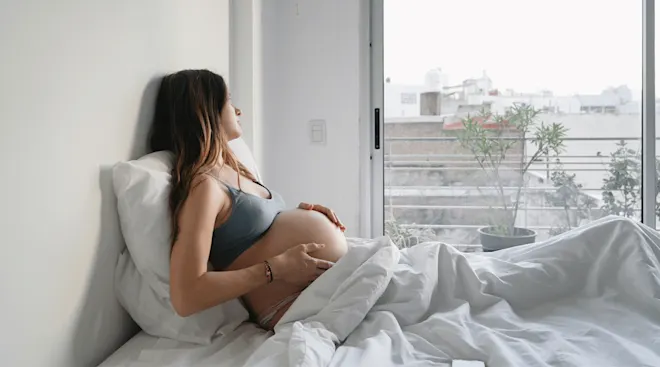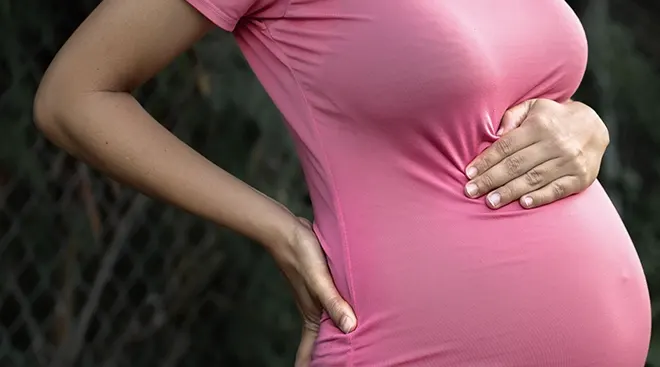Why You Might Have Blood in Your Stool While Pregnant
It’s understandable to worry if you see blood in your poop during pregnancy (or at any other time). But before you hit the panic button, know this: Blood in stool while pregnant isn’t exactly “normal,” but it’s usually not a sign that something’s seriously wrong. Some common pregnancy symptoms—like hemorrhoids, which are made worse by constipation—can cause rectal bleeding. More often than not, these issues aren’t dangerous and won’t harm you or baby.
That said, it’s still a good idea to talk to your doctor if you’re experiencing rectal bleeding during pregnancy. Here’s what you should know about blood in poop during pregnancy, including what causes it and how to get relief.
Rectal bleeding can be a result of certain changes in your body caused by pregnancy, such as hemorrhoids or anal fissures, says Rikki Baldwin, DO, an ob-gyn at Memorial Hermann Medical Group in Houston. However, any rectal bleeding or bloody stool symptoms should be evaluated by a medical provider, says Christine Noa Sterling, MD, ob-gyn and founder of Sterling Parents.
The most common causes of rectal bleeding during pregnancy are hemorrhoids and anal fissures, both of which can occur with constipation—an all-too-common pregnancy ailment. But there are other potential causes too, like gastrointestinal (GI) illnesses, infections and—rarely—cancer.
The color of the blood can be indicative of the source of bleeding, according to the National Library of Medicine (NLM): Red blood often comes from the lower GI tract, while black, tarry stools are often due to bleeding in the upper GI tract, such as the esophagus or stomach.
Here are a few possible explanations for rectal bleeding during pregnancy.
Hemorrhoids
Hemorrhoids are swollen blood vessels that can develop and worsen as your pregnancy progresses, says Baldwin. They swell because of the increased pressure placed on your pelvis and rectum as your uterus grows and expands. Constipation can cause or exacerbate hemorrhoids by causing you to strain during bowel movements, according to Penn Medicine.
There are two types of hemorrhoids, notes Sterling: internal and external, and both can cause blood in stool while pregnant. Internal hemorrhoids often go unnoticed in terms of pain and discomfort, though you might still see rectal bleeding if you have them, according to the American Society of Colon and Rectal Surgeons (ASCRS); external hemorrhoids are much more uncomfortable, and can cause itching, burning, swelling and bleeding.
Anal fissures
Anal fissures, or small tears in the rectum or anus, are another common cause of rectal bleeding during pregnancy, says Baldwin. They’re often caused by either straining and hard stools or frequent diarrhea, says the NLM. Just like constipation, diarrhea during pregnancy is often due to hormonal changes.
Gastrointestinal diseases
Gastrointestinal diseases like inflammatory bowel disease (IBD) and various diverticular diseases can cause rectal bleeding, research says. They often present with other gastrointestinal symptoms, including diarrhea and abdominal pain.
Infections
Less commonly, infections like E. coli can cause rectal bleeding during pregnancy. According to the American Academy of Family Physicians, E. coli can create sores in your intestines that bleed and cause bloody diarrhea.
Some sexually transmitted infections (STIs) can also cause rectal bleeding by causing inflammation of your rectum, or proctitis.
Colon cancer
Although colon cancer is a possible cause of blood in stool while pregnant, Sterling says there are much more common causes of rectal bleeding during pregnancy. If you’re pregnant and see blood in your stool, it’s much more likely to be hemorrhoids, an anal fissure or some other type of GI irritation. In fact, colon cancer represents a small number of rectal bleeding cases—around 3.4 percent, according to one study. Still, it’s important to check in about your symptoms with your healthcare provider.
Treatment for rectal bleeding during pregnancy depends on what’s causing your symptoms. It’s important to make sure a medical provider is overseeing the treatment. “Please don’t try to treat this on your own—it’s not a symptom that should be ignored,” says Sterling.
If your rectal bleeding is caused by hemorrhoids or anal fissures, possible treatments include:
- Softening stools to prevent constipation. To prevent constipation, drink plenty of water and increase the amount of fiber in your diet through leafy green vegetables, fruits and fruit juices, says Baldwin. If necessary, she adds, you can take an OTC stool softener to make it easier to go, but try to avoid laxatives unless you’re completely desperate since they can cause painful cramping.
- Using home remedies. You can sit on an ice pack, take a warm sitz bath or apply witch hazel pads to relieve anal fissures or hemorrhoids during pregnancy.
- Applying an OTC medication. Creams, lotions and gels designed to numb rectal pain or reduce discomfort are often safe to use during pregnancy, but always talk to your doctor first before using any OTC medication.
There aren’t any OTC medications that treat rectal bleeding specifically, says Sterling. If your rectal bleeding is caused by a gastrointestinal disease, possible treatments include:
- Pregnancy-safe medications to manage symptoms, including antibiotics, anti-inflammatories and steroids
- Avoiding trigger foods and staying hydrated, according to the Crohn’s and Colitis Foundation
- Increasing fiber
- Surgical intervention, if needed, during the second or third trimester
If your rectal bleeding is caused by an infection or illness, possible treatments include:
- Pregnancy-safe antibiotics to treat bacterial infections or STIs
- Hydration and rest
- Anti-diarrheal drugs for E. coli
Experts emphasize the importance of talking to your provider if you’re experiencing any kind of rectal bleeding or blood in your stool, no matter the suspected cause.
If there’s a large amount of blood, call your provider as soon as possible. “A little in the toilet, on the bowel movement itself or on the toilet paper calls for an appointment, [but] if you have more than a small amount of blood or you have any kind of continuous bleeding throughout the day, you should be evaluated right away,” says Sterling.
Rectal bleeding and bloody stools aren’t typical pregnancy symptoms, but some other normal symptoms—like constipation—can cause enough irritation to result in blood in poop during pregnancy. If you’re experiencing these symptoms, make sure to contact your healthcare provider, who will explain what’s going on and offer appropriate treatment.
Please note: The Bump and the materials and information it contains are not intended to, and do not constitute, medical or other health advice or diagnosis and should not be used as such. You should always consult with a qualified physician or health professional about your specific circumstances.
Plus, more from The Bump:
Rikki Baldwin, DO, is an ob-gyn at Memorial Hermann Medical Group in Houston. She earned her medical degree from the Texas College of Osteopathic Medicine at the University of North Texas Health Science Center in Fort Worth, Texas.
Christine Noa Sterling, MD, is an ob-gyn and the founder of Sterling Parents.
National Library of Medicine, Rectal Bleeding, May 2022
Penn Medicine, Hemorrhoids, September 2023
American Society of Colon and Rectal Surgeons, Hemorrhoids: Expanded Information
British Journal of General Practice, Factors Identifying Higher Risk Rectal Bleeding in General Practice, December 2005
American Academy of Family Physicians, E.coli Infection, September 2023
Mayo Clinic, Proctitis, March 2022
Crohn's & Colitis Foundation, Managing IBD: Nutrition
Learn how we ensure the accuracy of our content through our editorial and medical review process.
Navigate forward to interact with the calendar and select a date. Press the question mark key to get the keyboard shortcuts for changing dates.





















































